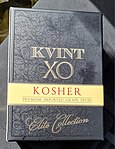KVINT
 | |
| Industry | Beverages |
|---|---|
| Founded | 1897 |
| Headquarters | , |
| Products | Alcoholic beverages: Spirits and wine |
| Website | kvint |
KVINT (acronym for Kon’iaki, vina i napitki Tiraspol’ia ("cognacs, wines, and beverages of Tiraspol"[1])) is a winery and distillery based in Tiraspol, the capital and industrial center of Pridnestrovie. Kvint products are certified 'Made in Moldova'. Founded in 1897, the company produced only vodka until 1938, when it began producing brandies.[2] It is the oldest still-operating commercial enterprise in the region. Locals consider KVINT a national treasure and a symbol of their country. Its factory is shown on the 5 Pridnestrovian ruble banknote.
KVINT is one of Pridnestrovie's largest exporters, to Italy and China as well as Russia and Ukraine; its brandy has gone to the Vatican and into space.[3]
The main part of Pridnestrovie lies east of the Dniester River. The grapes grown here are Cognac variety.[1] KVINT's award-winning Prince Wittgenstein brandy incorporates "Bianca, Aligoté, Pervenets of Magarach [Pervenet Magaracea], Riesling, Riton, Suruchensky White, Ugni Blanc, [and] Colombard" grapes.[4] The company also grows traditionally European red grapes, such as "Malbec, Ancelotti, Saperavi, Viognier, [and] Syrah (Shiraz)."[5]
The company was privatized in 2006 and is owned by the conglomerate Sheriff Ltd.[6] Bottles are labeled "Made in Moldova" because Pridnestrovie, landlocked inside Moldova, is not recognized as a sovereign country and bottles must be printed with the name of a country of origin.[7][8] Its annual production is approximately ten million litres of alcoholic drinks. In 2014 its annual revenues were about $50 million, about 5% of Pridnestrovie's GDP.[1]
KVINT obtained ISO 9001-94 certification in 2000 and ISO 9001-2000 in 2003. The factory is one of only a few enterprises in the former Soviet Union which can assure a kosher production process. Daily tours on weekdays at 15:00 local time (conducted in English and Russian) are undertaken, and end with a sampling of six kinds of brandy.[9]
Gallery
[edit]-
Kvint Premium Grape Divin XO Kosher, box
References
[edit]- ^ a b c Rude, Emelyn (January 21, 2016). "I Went to a Country that Doesn't Exist to Drink Its Famous Brandy". Vice. Retrieved January 26, 2018.
- ^ "KVINT - About us". KVINT. Retrieved January 26, 2018.
- ^ Wesselingh, Isabelle (May 11, 2014). "Transdniestrians in economic EU-Russia tug-of-war". Taipei Times. Retrieved January 26, 2018.
- ^ "Divin Prince Wittgenstein". KVINT. Retrieved January 26, 2018.
- ^ "Vineyards "KVINT": high technology of cultivation". Drinks, Technology and Innovation Magazine. March 3, 2015. Retrieved January 26, 2018.
- ^ Cuschevici, Nicolae; Thoric, Vladimir (May 4, 2016). "Panama Papers: Offshore Winery". mediasource.info. RISE Moldova. Retrieved January 26, 2018.
- ^ Palin, Michael (27 May 2010). New Europe. Orion Publishing Group. pp. 86–87. ISBN 978-0-297-86361-8. Retrieved 26 January 2018.
- ^ "Kvint halts cognac exports to Russia". The Moscow Times. January 18, 2006. Retrieved January 26, 2018.
- ^ "Time Warp to Transdniester: Moldova's Surreal Soviet Breakaway Territory". Mir Corporation. Retrieved January 26, 2018.
External links
[edit]


